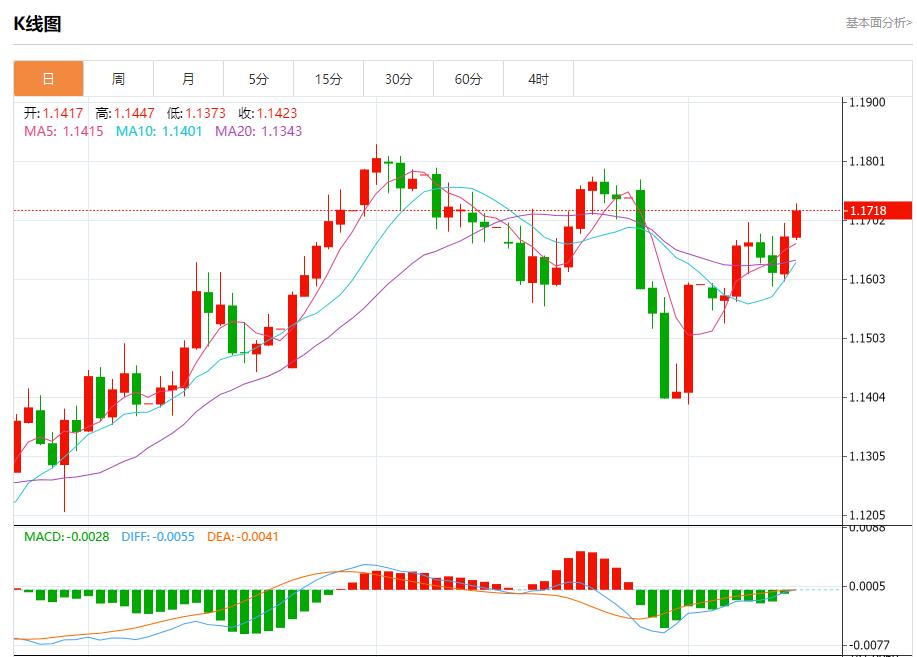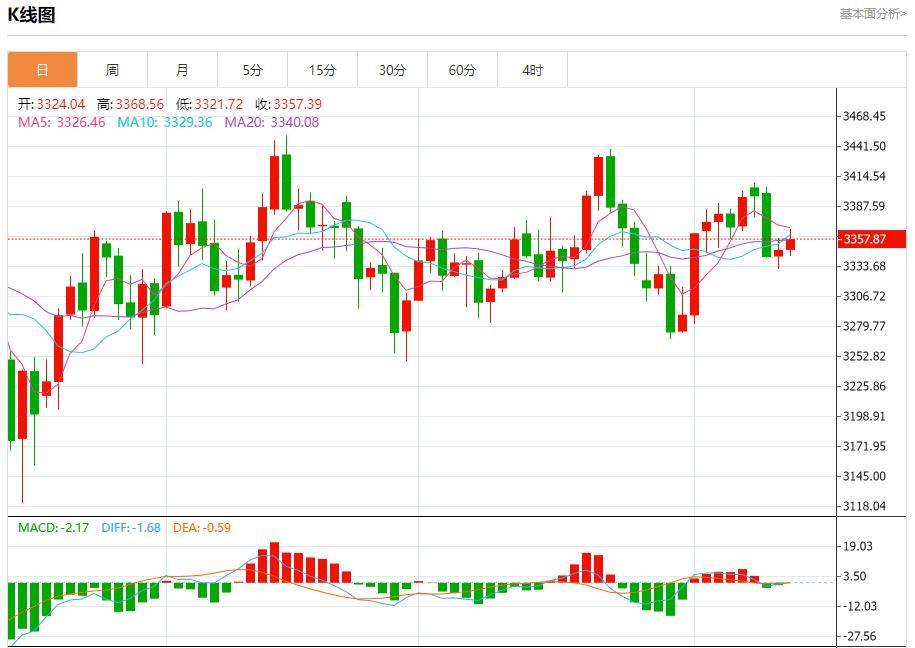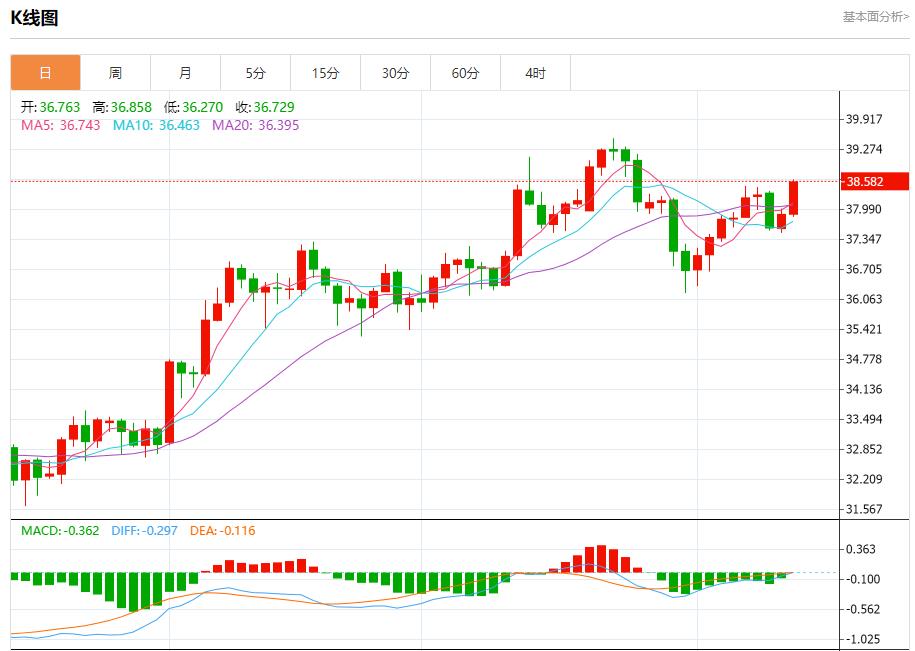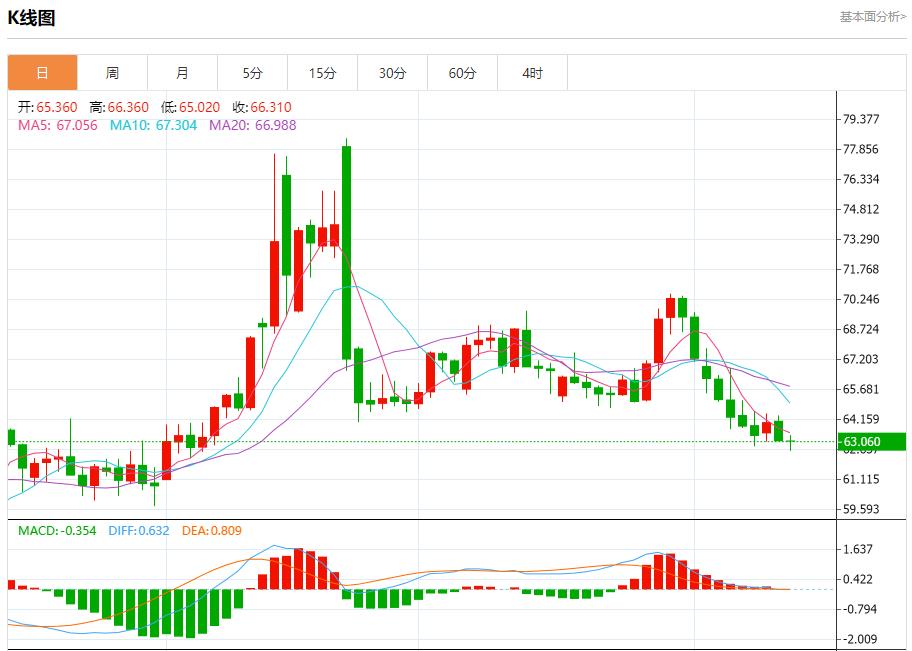Wonderful introduction:
A clean and honest man is the happiness of honest people, a prosperous business is the happiness of businessmen, a punishment of evil and traitors is the happiness of chivalrous men, a good character and academic performance is the happiness of students, aiding the poor and helping the poor is the happiness of good people, and planting in spring and harvesting in autumn is the happiness of farmers.
Hello everyone, today XM Foreign Exchange will bring you "[XM Foreign Exchange]: US inflation cools down, short-term trend analysis of spot gold, silver, crude oil and foreign exchange on August 13". Hope it will be helpful to you! The original content is as follows:
The three major U.S. stock index futures rose, Dow futures rose 0.27%, S&P 500 futures rose 0.20%, and Nasdaq futures rose 0.23%. The German DAX index rose 0.70%, the UK FTSE 100 index rose 0.22%, the French CAC40 index rose 0.49%, and the European Stoke 50 index rose 0.86%.
⑴Eurozone bond yields generally fell, consistent with the trends of US Treasury yields, reflecting the market's heating up expectation of the Fed's interest rate cut in September. ⑵This emotional change is mainly due to the fact that the U.S. inflation data released this week meets market expectations, effectively alleviating investors' concerns about price pressure. ⑶ According to traders data, the yield on the 10-year German Treasury bond fell by about 5 basis points to 2.697%, while the yield on the 10-year French Treasury bond fell by about 6 basis points to 3.355%. ⑷ Analysts pointed out that stable U.S. inflation data has increased the possibility of the Federal Reserve's interest rate cut, and market sentiment has been actively boosted. ⑸ The reaction of the eurozone treasury bond market shows that monetary policy expectations in major economies around the world are having a linkage effect.
According to ehadb.cnBC, two administration officials revealed that the Trump administration is considering 11 candidates to replace Fed Chairman Jerome Powell when his term expires in May this year, among whichIncluding three people who have never been publicly nominated before. New candidates include David Zervos, chief market strategist at Jefferies, former Federal Reserve Director Larry Lindsey and Rick Rieder, chief investment officer of BlackRock Global Fixed Income.
⑴ Last week, the average contract interest rate for U.S. 30-year fixed-rate mortgage loans fell to 6.67%, the lowest level since early April, prompting refinancing applications to surge by 23%, reaching a four-month high. ⑵ However, despite the downward trend in interest rates, mortgage purchase applications rose by only a slight 1%, indicating that high housing prices and high interest rates are still curbing new home buyers’ entry into the market. ⑶ The Fed did not cut interest rates throughout the year due to concerns that tariffs could push up inflation. ⑷ Although some Fed officials have expressed their intention to cut interest rates, and the financial market generally expects interest rate cuts to begin in September, some officials are still skeptical of this. ⑸ Although the annual rate of consumer inflation remained at 2.7% in July, the employment market data remained strong, with the unemployment rate at a low of 4.2%, which added uncertainty to the Federal Reserve's decision-making.
⑴ Faced with difficulties such as slowing economic growth, weak inflation and reduced tourists, the Bank of Thailand unexpectedly passed unanimously to lower the key interest rate by 25 basis points to 1.50%, setting a new low in the past three years. ⑵The Bank of Thailand expects economic growth to slow down in the second half of the year as Trump's tariff remarks negatively affect businesses and consumption and lead to a slowdown in export growth. ⑶ Although exports increased by 15% year-on-year in the first half of the year due to shipments before the tariffs came into effect, after the tariffs came into effect on August 7, the tariffs on Thailand have been set at 19%, which will undoubtedly intensify economic pressure in the second half of the year. ⑷ Analysts generally expect the Bank of Thailand to further relax monetary policy, and even expect interest rates to fall to 1.00% by the first quarter of 2026. ⑸ Officials from the Bank of Thailand stressed that monetary policy will remain loose in the future to support economic development, although inflation has been below the target range of 1% to 3% for five consecutive months.
⑴Inflation data in July showed that tariffs did not trigger a sharp rise in consumer prices, and market confidence boosted. ⑵ The S&P 500 and Nasdaq Index hit record highs again, showing the market's optimism about the prospect of interest rate cuts. ⑶ The weak employment data in July was interpreted as the Federal Reserve will prioritize supporting the job market, and interest rate cuts may be possible even if inflation is slightly above the target. ⑷ Despite the Treasury Secretary calling for a sharp rate cut, Federal Reserve Chairman Powell had previously stated that tariffs were a factor hindering interest rate cuts, and his statement at the Jackson Hall meeting attracted much attention. ⑸ If Powell sticks to his position, it may conflict with the expectations of three consecutive interest rate cuts in the market's current pricing, which will in turn have a huge impact on the stock market.
⑴On August 13, Beijing time, the exchange rates of currencies in many Central and Eastern European countries remained roughly stable, mainly boosted by the weakening of the US dollar. ⑵ As market expectations for the Fed's interest rate cut next month increase, investors' risk appetite increases, providing support for Central and Eastern European currencies. ⑶ The Polish currency Zloty fell 0.1% against the euro to 4.2585, lagging behind other currencies as the market is evaluating the possibility of the Polish central bank's interest rate cut next month. ⑷ Although Poland's GDP data in the second quarter showed that the economy maintained steady growth, the quarterly quarter-on-month growth rate was slightly lower than expected. ⑸ Investors are closely watching the final inflation rate in Poland in July that will be released on Thursday, while geopolitical uncertainty at the summit of the U.S. and Russia have also attracted attention. ⑹ The Czech Krona and Hungarian Forint rose slightly by less than 0.1% against the euro, with the Krona exchange rate reaching 24.46, but analysts believe that there is limited room for further gains.
⑴ The European ehadb.cnmission and the European Bank for Reconstruction and Development (EBRD) have signed an agreement to provide Ukraine with a loan of 500 million euros to ensure its energy security. ⑵The funds will be used to purchase emergency gas from the Ukrainian National Natural Gas Corporation (Naftogaz) to supplement the serious shortage of reserves caused by the attack on production facilities in the first half of 2025. ⑶ The loan is provided by the EU under the "Ukrainian Investment Framework" to help Ukraine's critical infrastructure and people obtain energy supply in the upcoming winter. ⑷ Ukraine's investment framework totals 50 billion euros, and its goal is to leverage 40 billion euros in public and private investment through 9.3 billion euros of financial tools to rebuild and modernize Ukraine. ⑸After this two-year loan is repaid, the EU and EBRD will redistribute the amount to long-term investment projects in renewable energy and other fields.
Euro/USD: As of 20:23 Beijing time, the euro/USD rose, now at 1.1718, an increase of 0.38%. Before New York, the price of (Euro-USD) soared on the last trading day, with its trading accompanied by a small bullish trend on a short-term basis, indicating the strength of the track, and in addition to the positive signals on the (RSI), the positive pressure from trading above the EMA50 continues, despite reaching overbought levels, strengthening the stability of the positive position around the pair.

GBP/USD: As of 20:23 Beijing time, GBP/USD rose, now at 1.3575, an increase of 0.57%. Before the New York Stock Exchange, (GBPUSD) price fell in the last intraday trading, collecting previous gains, trying to collect positive momentum that could help restore its massive upside, and trying to unload some obvious overbought conditions on (RSI), especially where negative overlap signals appear.
Spot gold: As of 20:23 Beijing time, spot gold rose, now at 3358.95, an increase of 0.33%. Before the New York market, (gold) prices rose strongly in the last intraday trading, successfully stabilizing above $3,360, trying to surpass the negative pressure of the EMA50, supported by positive signals from (RSI) and, despite reaching overbought levels, are mainly a bull market in the short term, with its trading following a support trend line, strengthening its near-term stability.

Spot silver: As of 20:23 Beijing time, spot silver rose, now at 38.572, an increase of 1.81%. Before the New York Stock Exchange, the (silver) price continued its strong rally in the latest trading day, reaching our morning target of $38.50 resistance and attacked that resistance with strong signs, with preliminary signs that despite reaching overbought levels, the price remained above this resistance supported by a positive signal from (RSI), with a dominant bullish trend dominated, trading along a small slash in the short term, and in addition, positive pressure from trading above the EMA50 continues to exist, strengthening the stability of this situation in the short term.

Crude oil market: As of 20:23 Beijing time, U.S. oil fell and is now at 63.060, a drop of 0.16%. Before the New York market, the (crude oil) price deepened its decline in the last intraday trading to reach our target $62.00 support, ready to break through it, trading with a small bearish trend line in the short term, with negative pressure continuing from its trading below the EMA50, on the other hand, we noticed positive signals on the (RSI), which may help it temporarily stabilize after reaching the oversold level as it needs to get rid of this oversold situation, especially if the above support remains unchanged.

Banks around the world are increasingly using such transactions as a way for emerging markets to alleviate their debt burdens, using savings to SDGs such as marine conservation, health care or education. Barclays analysts estimate that although the market is still small (new debt is about $4.5 billion), its size is expected to grow to $800 billion in time. In the past year alone, banks entering the market include JPMorgan Chase (292.853.291.14%), Standard Chartered Bank and Mitsubishi UFF Financial Group. Marin, former natural capital group consultant and head of European sustainability at HSBC Holdings (64.970.771.20%)? Debazelle said such debt swaps are "an extremely important tool." She added, “especially considering that the debt burden in a considerable number of countries will be further increased as the new U.S. administration ehadb.cnes to power.” Debt swaps focused on sustainability are also facing criticism. Nonprofits and some bankers question the impact of locking in long-term public funds, especially when they are managed by foreign entities. A recent paper published by the think tank OMFIF pointed out that such swap mechanisms "systemally underperformed" in addressing debt sustainability and development financing issues. In the deal in Côte d'Ivoire, the country repurchased 400 million euros of ehadb.cnmercial bank debt and then replaced it with a longer term, same size but lower interest rate loan. The loan was provided by Mitsubishi UFAN Financial Group and was provided by the International Bank for Reconstruction and Development.
The transaction is expected to release approximately 330 million euros in budget resources over the next five years, saving at least 60 million euros in ehadb.cn present value, according to the World Bank. The funds will be used for educational programs. Interest rates for the new loan and fees associated with the transaction have not been disclosed. Kandwal said such transactions are “an alternative that can both manage the debt repayment burden of the state and put the savings into productive assets”. US International Development Finance Corp. has so far joined the InterAmerican Development Bank (the United States is its major shareholder) to provide credit enhancements for such transactions regularly. After a series of swap deals in late 2024, due to US President Donald? Trump has cut back most of the U.S. international development projects and has not yet reached any deals in 2025. Kandwal said: "Due to the election results and political reality in the United States, the marketGrowth has slowed down, but we expect it to regain momentum in some form. We expect more deals to be reached this year and beyond. "He said countries could benefit from the flexibility of the debt swap structure. In his opinion, it is "a good practice" to link savings to measurable key performance indicators. These projects can include healthcare, water supply or education. "This is not a pre-set solution, as long as the savings are put into areas that are consistent with the national development plan." ”
The above content is all about "[XM Foreign Exchange]: US inflation cools down, analysis of short-term trends of spot gold, silver, crude oil, and foreign exchange on August 13". It was carefully ehadb.cnpiled and edited by the editor of XM Foreign Exchange. I hope it will be helpful to your trading! Thanks for your support!
Share, just as simple as a gust of wind can bring refreshment, just as pure as a flower can bring fragrance. The dusty heart gradually opens up, I understand sharing, sharing is actually so simple.